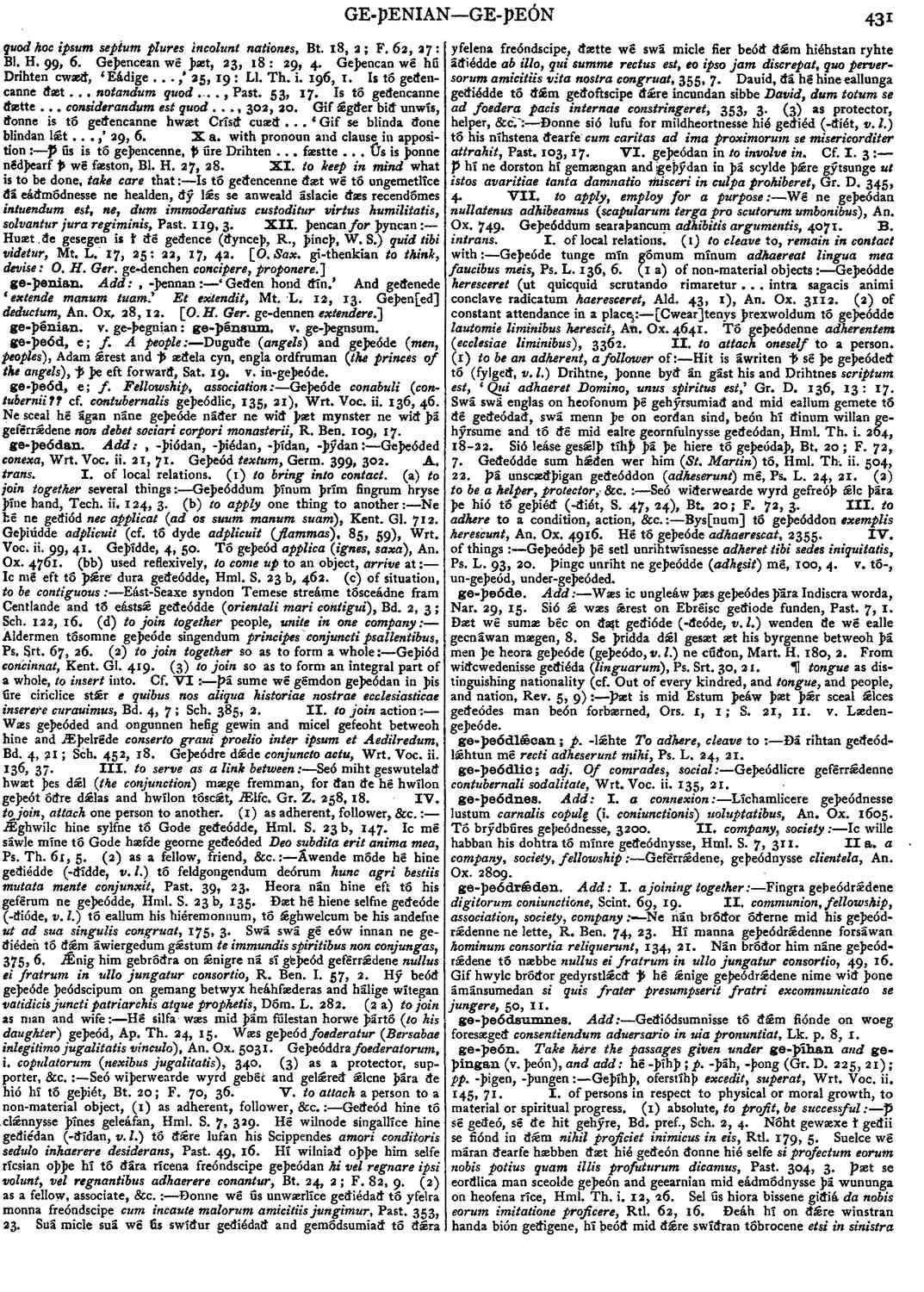ge-þeódan
- verb
-
Geþeóded
conexa,
- Wrt. Voc. ii. 21, 71.
-
Geþeód
textum,
- Germ. 399, 302. A. trans.
-
Geþeóddum þínum þrím fingrum hryse þíne hand,
- Tech. ii. 124, 3.
-
Ne hé ne geðiód
nec applicat (ad os suum manum suam ),
- Kent. Gl. 712.
-
Geþiúdde
adplicuit (cf. tó dyde adplicuit (flammas ),
- 85, 59), Wrt. Voc. ii. 99, 41.
-
Geþídde,
- 4, 50.
-
Tó geþeód applica (ignes, saxa), An. Ox. 4761. (bb) used reflexively, to come up to an object,
arrive
at :-- Ic mé eft tó þǽre dura geðeódde,- Hml. S. 23 b, 462.
-
Eást-Seaxe syndon Temese streáme tósceádne fram Centlande and tó eástsǽ geðeódde (
orientali marl contigui
),- Bd. 2, 3; Sch. 122, 16.
-
Aldermen tósomne geþeóde singendum
principes conjuncti psallentibus,
- Ps. Srt. 67, 26.
-
Geþiód
concinnat,
- Kent. Gl. 419.
-
Þá sume wé gémdon geþeódan in þis úre ciriclice stǽr
e quibus nos aliqua historiae nostrae ecclesiasticae inserere curauimus,
- Bd. 4, 7; Sch. 385, 2.
-
Wæs geþeóded and ongunnen hefig gewin and micel gefeoht betweoh hine and Æþelréde
conserto graui proelio inter ipsum et Aedilredum,
- Bd. 4, 21; Sch. 452, 18.
-
Geþeódre dǽde
conjuncto actu,
- Wrt. Voc. ii. 136, 37.
-
Seó miht geswutelað hwæt þes dǽl (
the conjunction
) mæge fremman, for ðan ðe hé hwílon geþeót óðre dǽlas and hwílon tóscǽt,- Ælfc. Gr. Z. 258, 18.
-
Ǽghwilc hine sylfne tó Gode geðeódde,
- Hml. S. 23 b, 147.
-
Ic mé sáwle míne tó Gode hæfde georne geðeóded
Deo subdita erit anima mea,
- Ps. Th. 61, 5.
-
Áwende móde hé hine geðiédde (-ðídde, v. l.) tó feldgongendum deórum
hunc agri bestiis mutata mente conjunxit,
- Past. 39, 23.
-
Heora nán hine eft tó his geférum ne geþeódde,
- Hml. S. 23 b, 135.
-
Ðæt hé hiene selfne geðeóde (-ðióde, v. l.) tó eallum his hiéremonnum, tó ǽghwelcum be his andefne
ut ad sua singulis congruat,
- 175, 3.
-
Swá swá gé eów innan ne geðiéden tó ðǽm áwiergedum gǽstum
te immundis spiritibus non conjungas,
- 375, 6.
-
Ǽnig him gebróðra on ǽnigre ná sí geþeód geférrǽdene
nullus ei fratrum in ullo jungatur consortio,
- R. Ben. I. 57, 2.
-
Hý beóð geþeóde þeódscipum on gemang betwyx heáhfæderas and hálige wítegan
vatidicis juncti patriarchis atque prophetis, Dóm. L. 282. (2 a) to join as man and wife :-- Hé silfa wæs mid þám fúlestan horwe þártó (to his daughter )
geþeód,- Ap. Th. 24, 15.
-
Wæs geþeód
foederatur (Bersabae inlegitimo jugalitatis vinculo ),
- An. Ox. 5031.
-
Geþeóddra
foederatorum, i. copulatorum (nexibus jugalitatis ),
340.
-
Seó wiþerwearde wyrd gebét and gelǽreð ǽlcne þára ðe hió hí tó geþiét,
- Bt. 20; F. 70, 36.
-
Geðeód hine tó clǽnnysse þínes geleáfan,
- Hml. S. 7, 329.
-
Hé wilnode singallíce hine geðiédan (-ðídan, v. l.) tó ðǽre lufan his Scippendes
amori conditoris sedulo inhaerere desiderans,
- Past. 49, 16.
-
Hí wilniað oþþe him selfe rícsian oþþe hí tó ðára rícena freóndscipe geþeódan
hi vel regnare ipsi volunt, vel regnantibus adhaerere conantur,
- Bt. 24, 2; F. 82, 9.
-
Ðonne wé ús unwærlíce geðiédað tó yfelra monna freóndscipe
cum incaute malorum amicitiis jungimur,
- Past. 353, 23.
-
Suá micle suá wé ús swíður geðiédað and gemódsumiað tó ðǽra yfelena freóndscipe, ðætte wé swá micle fier beóð ðǽm hiéhstan ryhte áðiédde
ab illo, qui summe rectus est, eo ipso jam discrepat, quo perversorum amicitiis vita nostra congruat,
- 355, 7.
-
Dauid, dá hé hine eallunga geðiédde tó ðǽm geðoftscipe ðǽre incundan sibbe
David, dum totum se ad foedera pacis internae constringeret,
- 353, 3.
-
Ðonne sió lufu for mildheortnesse hié geðiéd (-ðiét, v. l.) tó his níhstena ðearfe
cum caritas ad ima proximorum se misericorditer attrahit,
- Past. 103, 17.
-
Ꝥ hí ne dorston hí gemængan and geþýdan in þá scylde þǽre gýtsunge
ut istos avaritiae tanta damnatio misceri in culpa prohiberet,
- Gr. D. 345, 4.
-
Wé ne geþeódan
nullatenus adhibeamus (scapularum terga pro scutorum umbonibus ),
- An. Ox. 749.
-
Geþeóddum searaþancum
adhibitis argumentis,
4071. B. intrans.
-
Geþeóde tunge mín gómum mínum adhaereat lingua mea faucibus meis Ps. L. 136, 6. (1 a) of non-material objects :-- Geþeódde heresceret (ut quicquid scrutando rimaretur ... intra sagacis animi conclave radicatum
haeresceret,
- Ald. 43, 1), An. Ox. 3112.
-
[Cwear]tenys þrexwoldum tó geþeódde
lautomie liminibus herescit,
- An. Ox. 4641.
-
Tó geþeódenne
adherentem (ecclesiae liminibus ),
3362.
-
Hit is áwriten ꝥ sé þe geþeódeð tó (fylgeð, v. l.) Drihtne, þonne byð án gást his and Drihtnes
scriptum est, 'Qui adhaeret Domino, unus spiritus est,'
- Gr. D. 136, 13: 17.
-
Swá swá englas on heofonum þé gehýrsumiað and mid eallum gemete tó ðé geðeódað, swá menn þe on eorðan sind, beón hí ðinum willan gehýrsume and tó ðé mid ealre geornfulnysse geðeódan,
- Hml. Th. i. 264, 18-22.
-
Sió leáse gesǽlþ tíhþ þá þe hiere tó geþeódaþ,
- Bt. 20; F. 72, 7.
-
Geðeódde sum hǽðen wer him (
St. Martin
) tó,- Hml. Th. ii. 504, 22.
-
Þá unscæðþigan geðeóddon (
adheserunt
) mé,- Ps. L. 24, 21.
-
Seó wiðerwearde wyrd gefreóþ ǽlc þára þe hió tó geþiéð (-ðiét,
- S. 47, 24), Bt. 20; F. 72, 3.
-
Bys[num] tó geþeóddon
exemplis herescunt,
- An. Ox. 4916.
-
Hé tó geþeóde
adhaerescat,
2355.
-
Geþeódeþ þé setl unrihtwísnesse
adheret tibi sedes iniquitatis,
- Ps. L. 93, 20.
-
Þingc unriht ne geþeódde (
adhęsit
) mé,- 100, 4. v. tó-geþeód, un-geþeód, under-geþeóded.
Bosworth, Joseph. “ge-þeódan.” In An Anglo-Saxon Dictionary Online, edited by Thomas Northcote Toller, Christ Sean, and Ondřej Tichy. Prague: Faculty of Arts, Charles University, 2014. https://bosworthtoller.com/50081.
Checked: 0